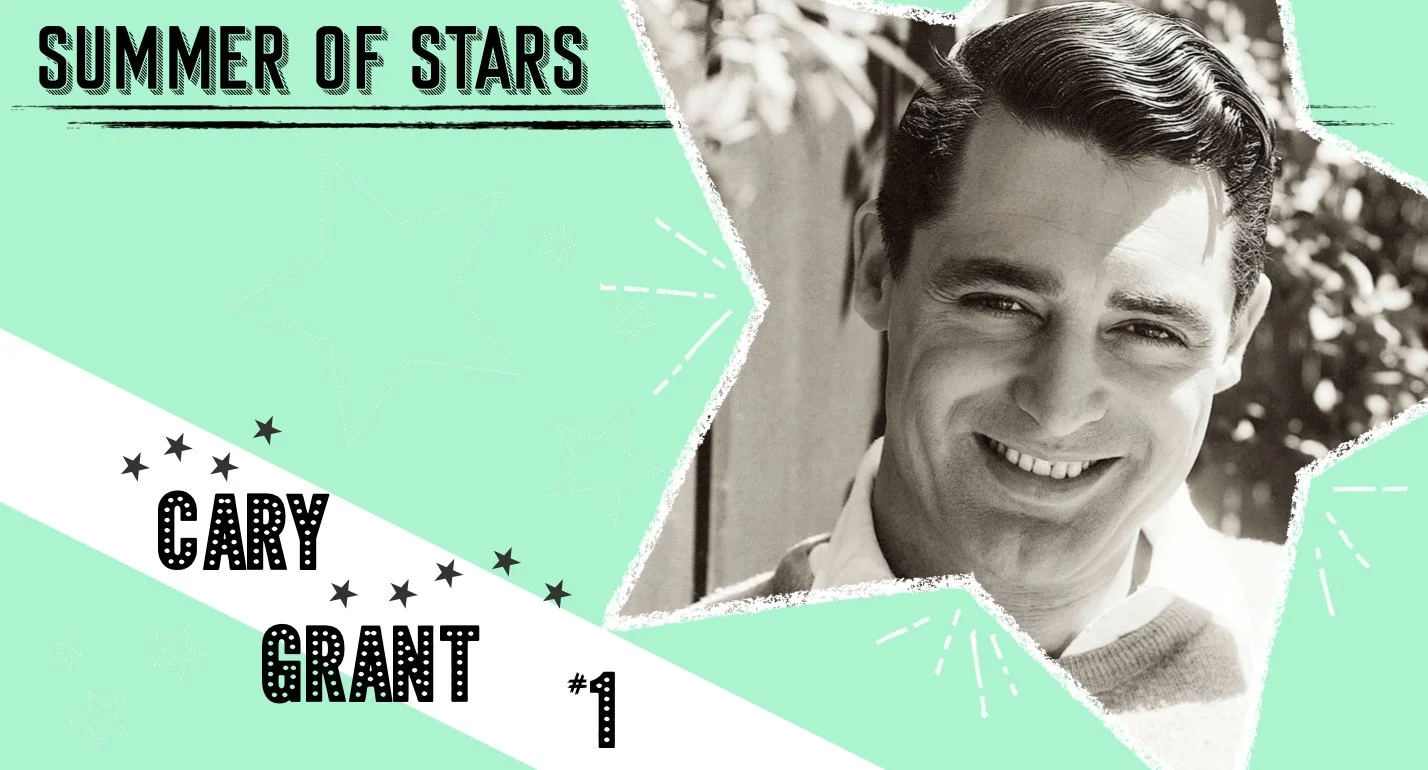SUMMER OF STARS #1: Cary Grant
by Jaime Davis, Staff Writer
It’s hard for me to think of another actor of any generation whose star shines as bright as Cary Grant’s. It’s been almost 40 years since we lost him, yet, thankfully, his vast and varied body of work shines on. Grant offers audiences a little bit of everything - good looks, an all-around congenial demeanor, glamour, devilishly witty comedic timing, and a sense of international urbanity (Grant is British by birth, accounting for his distinctly crisp manner of speech). He brought so much to every role, from lovable scamp (That Touch of Mink) to dashing playboy (An Affair to Remember), to unlikely action hero (North by Northwest), even shimmering in his portrayal of less than savory characters (Suspicion, To Catch a Thief).
I first became acquainted with Cary Grant in the early 90s, in a film that he technically didn’t star in at all, Sleepless in Seattle. My mom and I were obsessed with the Nora Ephron classic, renting it multiple times, swooning over the unique love story of Annie Reed and Sam Baldwin, respectively played by America’s Sweethearts of the day, Meg Ryan and Tom Hanks. Annie in turn is obsessed with the 1957 romantical tear-jerker, An Affair to Remember, starring the lovely Deborah Kerr and Cary Grant as star-crossed lovers. It’s a Hollywood romance of the highest, most elegant order - Kerr and Grant meet and fall in love in a time when women wore furs to dinner and folks sipped pink champagne from coupes in between drags on their cigarettes.
My mom and I were curious about An Affair to Remember, and promptly rented it from the library and watched it over and over and over. In it, Grant is at his most urbane as an internationally known playboy about to be married to an heiress, only to fall for the sophisticated yet virtually penniless Kerr. We fell hard for both Grant and Kerr, and it wasn’t long after that I learned of a curiously random fact connecting me to Grant in an odd way – Grant passed away in the same hospital that I was born in seven years prior, St. Luke’s. In Davenport, Iowa of all places. It’s a teensy bit weird, right? I’m not even like, from Iowa really (my parents only lived there for about a year when I was born, and not long after they relocated us back to the Chicago suburbs where they’re from). Grant happened to be on a tour of his one man show, A Conversation with Cary Grant, until Davenport became his last stop. I used to think about whether the ghost of Grant haunted that hospital, and would that frustrate the notoriously glamorous star? Like what a bummer of a place to get stuck with.
A few decades later, the hospital converted to apartments – still, not very exciting for such a Hollywood heavyweight. I recently learned that they ended up demolishing the old building, so at least now his ghost is free! (If ghosts are even stuck to one place like that when they die, who knows. I mean if The Sixth Sense is accurate, then ghosts can move around all the time and talk to little kids whenever they damn well please. Ghostly Bruce Willis runs wild all over Philly in it, so maybe M. Night knows something I don’t know. Or maybe ghosts only inhabit places where they have unfinished business? If ghosts even exist and all that).
Anyway, to celebrate one of the biggest stars in Moviejawn’s Summer of Stars, here are my three favorite Grant performances.
The Bishop’s Wife (dir. Henry Koster, 1947)
Grant plays an actual ghost! Okay no, not really ‘cause everyone can see him. He’s actually an angel sent down to help repair the relationship between the titular Bishop’s wife, Julia, a literal human saint, and her crotchety husband, the Bishop. In the film, the angel Dudley is so congenial that everyone gravitates towards him and falls in love almost immediately. Everyone, that is, except for mean old Bishop dude! In order to truly buy into the story, the audience needs to believe in Dudley’s sweetness and light. And throughout the film, Grant is so totally affable – you can’t help but smile as he wins over surly taxi drivers and spinster assistants, spirits a typewriter into taking his dictation all on its own, and woos a wealthy benefactress with his mad harp-playing skills. I can’t imagine anyone else charming their way through this role (except for Denzel Washington, who played Dudley in the 1996 remake, The Preacher’s Wife. Catch Denzel at #3 on MJ’s Summer of Stars list).
To Catch a Thief (dir. Alfred Hitchcock, 1955)
Insert like every catcall ever cause I’m about to get real superficial. Cary Grant is fine. Like ultra-fine. Like finer than fine, if that’s a thing. He’s all tan and distinguished, wearing the coolest French-inspired striped shirt and neckerchief combo (I die), oozing suaveness (suaveneity?) in tuxes and chic suits. But it’s more than just his looks (and his lewks) that I love – it’s the fact that Grant so perfectly understands the nuance of the character, a former jewel thief who may or may not be back on the prowl. As he and the young heiress Frances (Grace Kelly) become wrapped up in each other’s orbit, it’s a joy to watch him straddle the line between good and bad. Grant’s walk on the wild side just feels dangerous…and that’s hot.
Suspicion (dir. Alfred Hitchcock, 1941)
Dashing playboy in An Affair to Remember has always been my all-time favorite Grant. Until I saw him in Suspicion playing a potentially bad, bad man who may or may not be trying to kill his wife! But how could anyone want to hurt sweet Joan Fontaine?? It’s completely disorienting to watch Grant in such a role, but to see how he embodies it so fully and profoundly is wicked fun. Once again, you, as the audience, truly believe that he is capable of the evil Joan Fontaine suspects him of, despite his innate charm and beauty. What a man of so many faces, so many talents, such broad appeal! I’d happily let him haunt my apartment any day.





